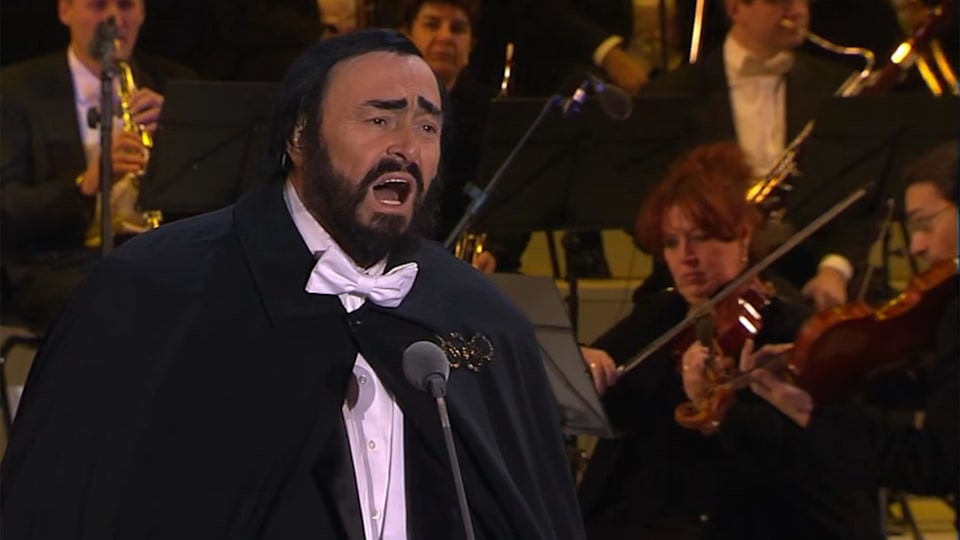When sport meets music - Pavarotti at Turin 2006
Organisers of the Olympic Winter Games Turin 2006 spent months persuading Luciano Pavarotti to sing at their Opening Ceremony. It was well worth all the effort. The sight and sound of the tenor singing the aria Nessun Dorma in the Stadio Olimpico – in what proved to be his final performance – continues to represent the perfect union of sport and music.

Standing beneath a gigantic theatre curtain wearing a billowing black cape with the Olympic rings embroidered on it in silver and with the Olympic flame burning wildly above him, Pavarotti reminded the world on that cold February evening that he was one of the most influential cultural figures of recent times.
For several minutes it did not matter that the Italian was ailing and that the pancreatic cancer that would cruelly take his life in September 2007 had already started to affect him. It did not even matter when it later emerged that the great opera singer had required pre-recorded help to ensure his voice reverberated around the stadium in its full glory. Instead, for two minutes and 40-odd seconds, arguably the greatest, and undeniably the most famous, opera star ever held his vast audience entranced one final time.
“It was amazing,” Peter Fill, Italy’s World Cup-winning downhill skier, for whom Turin 2006 represented the first of his four Olympic Games to date, said. “He was a national hero, famous in the whole world but loved so much in Italy. He was an amazing figure, not only the voice, but the whole person. And Nessun Dorma is one of my favourite songs of his, a really great song.”
For more than 15 years prior to the Turin Games, Nessun Dorma had been many sports fans’ favourite tune, since, sung by Pavarotti, it had become a much-loved unofficial theme tune for the Italy 1990 football World Cup. It is an extraordinary accolade for an aria that forms part of an opera, Turandot, written by Giacomo Puccini and first performed in 1926.
“It has that sense of drama and victory. It makes your hair stand up on end and your spine tingle and he (Pavarotti) was just a brilliant communicator of that,” Martin Cullingford, editor of classical music bible, Gramophone magazine, said. “It embodies everything that is most dramatic about an aria. It is calm, melodic at the beginning, followed by an off-stage effect and then that highly dramatic conclusion.
“In sport there is drama and loss and that’s all there in the music. It seemed to be a perfect union that grabbed people’s emotions and he was just the right person to do it.”
Pavarotti had most famously performed Nessun Dorma as part of the first Three Tenors concert alongside Spaniards Placido Domingo and Jose Carreras at the Caracalla Baths in Rome on the eve of the World Cup final in 1990. The recording of this is still one of the best-selling classical albums of all time. And, as such, it needed only the opening few bars of music in Turin on 10 February 2006 for the watching audience to know just what was coming.
It was amazing. He was a national hero, famous in the whole world but loved so much in Italy. He was an amazing figure, not only the voice, but the whole person. Peter Fill Italian skiier - Peter Fill Italian skiier
“It felt very right that he sang it there, his signature tune,” Cullingford said. “In this repertoire, Italian bel canto, he probably had one of the most beautiful voices of all time.”
The wild, and seemingly never-ending, ovation Pavarotti received after hitting the final note in Turin is testament to this. And, while huge rock stars have long opened global sports events, it is a significant compliment to the classical genre that the then 70-year-old Italian’s performance in 2006 has stayed embedded as one of the most iconic Olympic moments. Naturally, credit for this goes to the man himself, but not just for the power of his voice, but more for his long-standing ability to reach out far beyond the borders of his day job.
“He started that crossover career of concert performances that reached wide audiences, non-opera specialists. He proved able, as a person and a performer, to engage with audiences on an emotional level, far beyond that of usual classical music stars,” Cullingford said of the man who recorded duets with Eric Clapton, Elton John, Jon Bon Jovi and Bono, among many others.
“He took opera music way beyond an audience it had ever reached before. He was perhaps the biggest ambassador ever for the art form.”
The jovial star’s love of football, ease among people of all backgrounds and obvious relish for life in the spotlight ensured Pavarotti became a name revered the world over. His funeral, broadcast live on Italian television, was closer to those normally reserved for state figures. And as the Italian air force flew by in honour of one of the nation’s favourite sons, there was, of course, only one choice for the accompanying music: Nessun Dorma.
“He became a megastar. He was the sort of figure – and there aren’t many of them – which the world pays attention to,” Cullingford said. “There is no one quite like him and I can’t see anyone emerging. Not like he did, on a football terrace, wearing a scarf and shaking people’s hands.”
